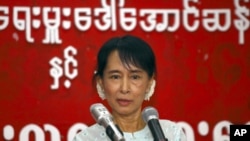Burma's most prominent opposition party is calling for talks with Western nations to see if international sanctions on the military-controlled government can be reworked to improve the living standards of the average Burmese citizen.
The National League for Democracy, led by Nobel laureate Aung San Suu Kyi, says the sanctions should not be lifted as long as more than 2,000 political prisoners remain in captivity. But the party also urges talks with the United States, the European Union, Canada and Australia to consider "when, how and under what circumstances sanctions might be modified in the interests of democracy, human rights and a healthy economic environment."
Since 1997, the United States has imposed a range of economic sanctions on Burma for the government’s repressive policies. The sanctions include bans on importing Burmese products into the United States and exporting financial services from the United States to Burma.
VOA's Sarah Williams asked Sean Turnell, an associate professor of economics at Macquarie University in Sydney, Australia, and the author of “Fiery Dragons: Banks, Moneylenders and Microfinance in Burma,” about what is motivating the opposition.
Why do you think the NLD is rethinking its stance on sanctions?
"I think what they are doing in calling for dialogue is just indicating that they’re flexible. If you look through what they are calling for, they are really saying, 'Look, Burma’s economic problems mostly come from policies of the regime, that the sanctions have been imposed essentially because of the extraordinary human rights abuses, and so on, that have taken place in Burma over many years, and so the best way to get sanctions off is to [address] those particular problems in the human rights area.'
So, that’s the majority of the document. Toward the end, they talk about dialogue, but I think it is very much in the context of needing to come up with the strategy of ‘Well, how would we alleviate sanctions, how would we begin to lift that process, how better could we integrate Burma with the rest of the world if genuine change were to take place?'"
How do they measure the impact of the sanctions?
"Well, that’s a really good question, because, of course, it is incredibly difficult. In a sense it is trying to determine] what would have taken place in the absence of sanctions. Personally, I think the impact is actually quite minimal. That’s essentially because the economic damage done by the regime has been so severe. If we look into Burma’s economy, sanctions are really a marginal issue in terms of the overall economic performance. Burma’s economy was driven down well before sanctions came in. In that context, I think it is always important to remember that the sanctions only came in, in the fullest measure, really, in about 2003. And even up to the present, they are not really fully implemented. So, Burma’s problems go way beyond the sanctions."
What is the state of the Burmese economy? Is it ready for foreign investment?
"It’s in a dreadful state at the moment, which is an incredible state of affairs, really, because at the end of World War II, Burma was the richest country in South East Asia. It was the country that everyone expected it to most quickly catch up to the West. The fact is now that it usually ranks in the bottom 10 or so countries on just about every measure we can think of with respect to economic and human development. So, it really is in a dire state.
"I think at the moment it is not really the situation that foreign investment either would be attracted to the country or would do much good. And, in fact, if we look at what foreign investment there is at the moment, it’s investment from countries like China or some other Asian countries that are very interested in extracting energy and other nature resources out of Burma. But, they are not really very interested in implementing long-term investment -- building factories and the like, the sorts of things that would require better economic foundations and institutions in Burma. Those institutions and foundations are not there. So, I think there does need to be a broader political economy change for good, long-term investment to take place in Burma."
Are the sanctions affecting the generals? Where do they keep their money?
"Burma’s economy is very much divided. There’s a formal economy, which is the big, money earning enterprises, the gas enterprises, and so on. Those enterprises belong to the state, to the generals and to the various cronies connected to them. Now, they are the ones most affected by international sanctions. The majority of Burmese people, of course, eke out an existence in little more than subsistence agriculture; [it's] very much an informal economy and they have very little to do, obviously, with the international economy. So, for them, sanctions don’t really bite that much. I think it is the case that sanctions hurt the generals and the people connected to them more than anyone else.
"Many countries, including Australia, the United States and the European Union have financial sanctions which block international financial flows and that particularly affects the generals. Now the generals, of course, have not changed their behavior as yet, which, I think says much about them as much as it does about the effectiveness of sanctions.




